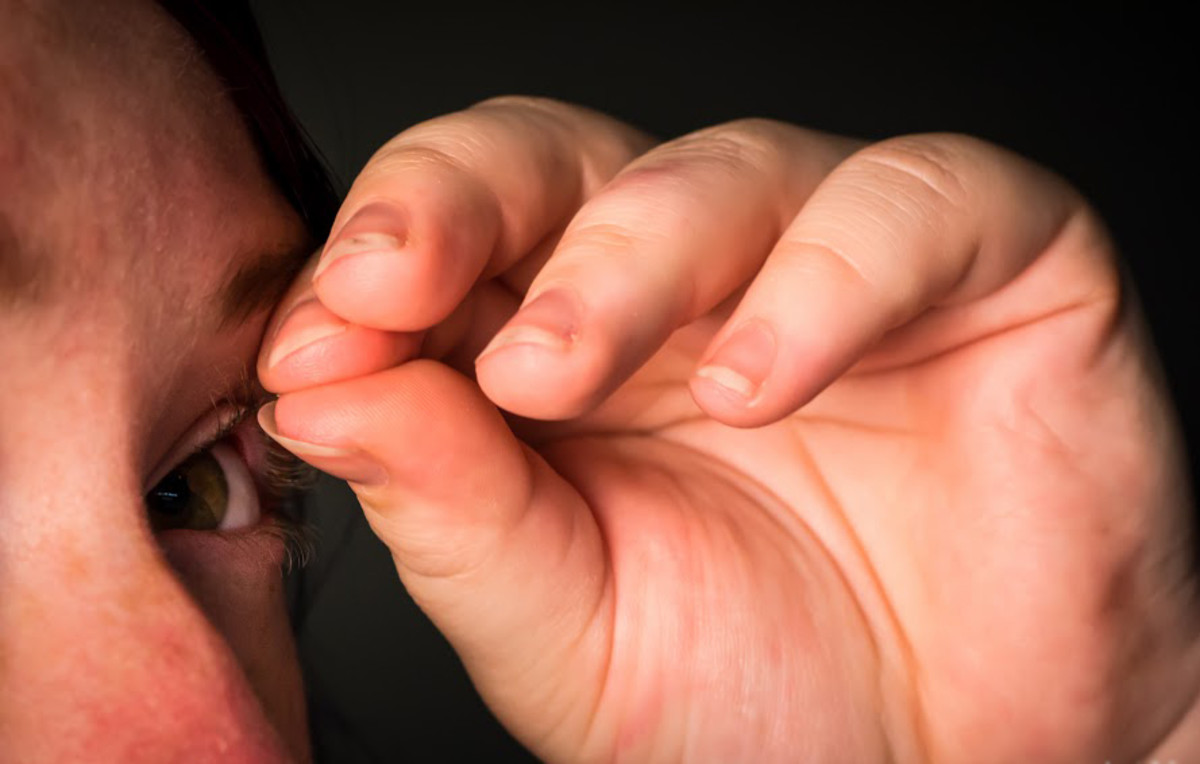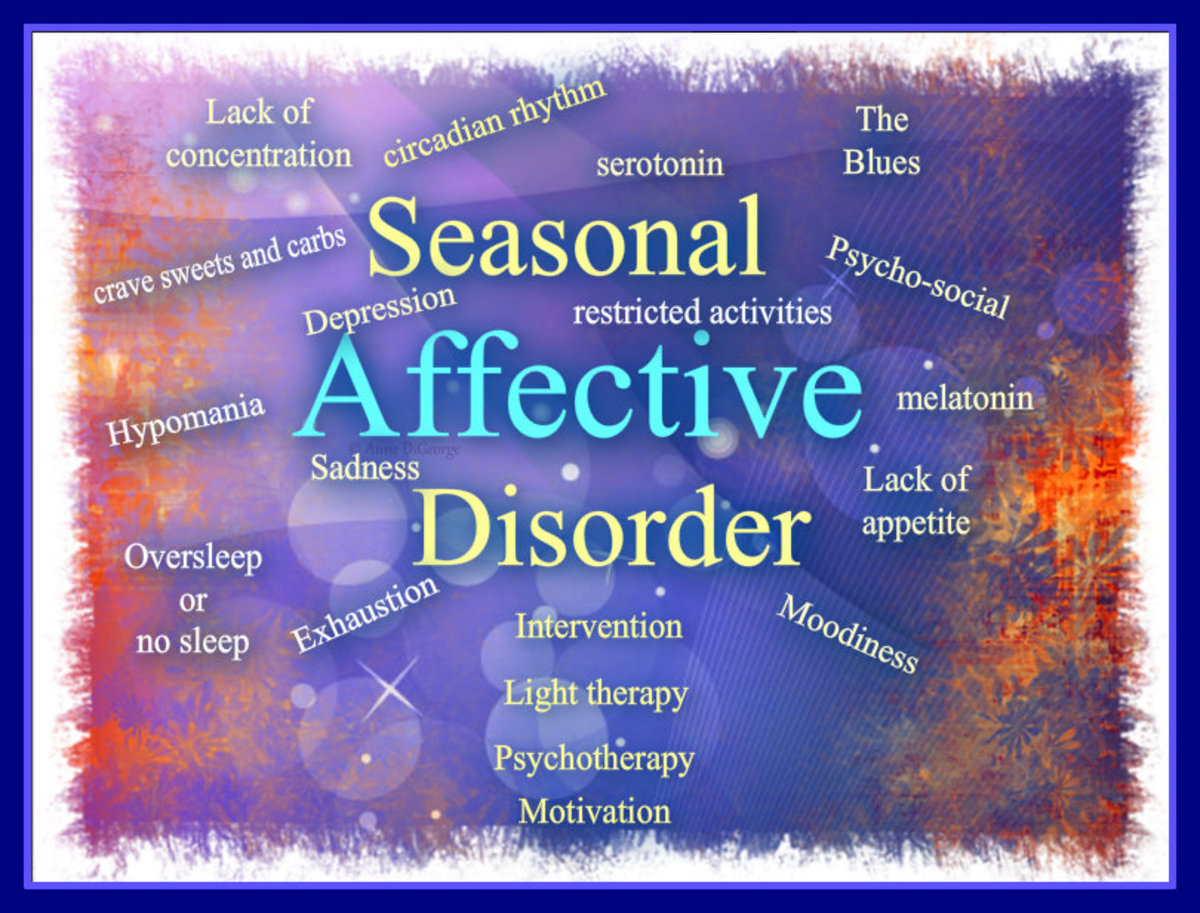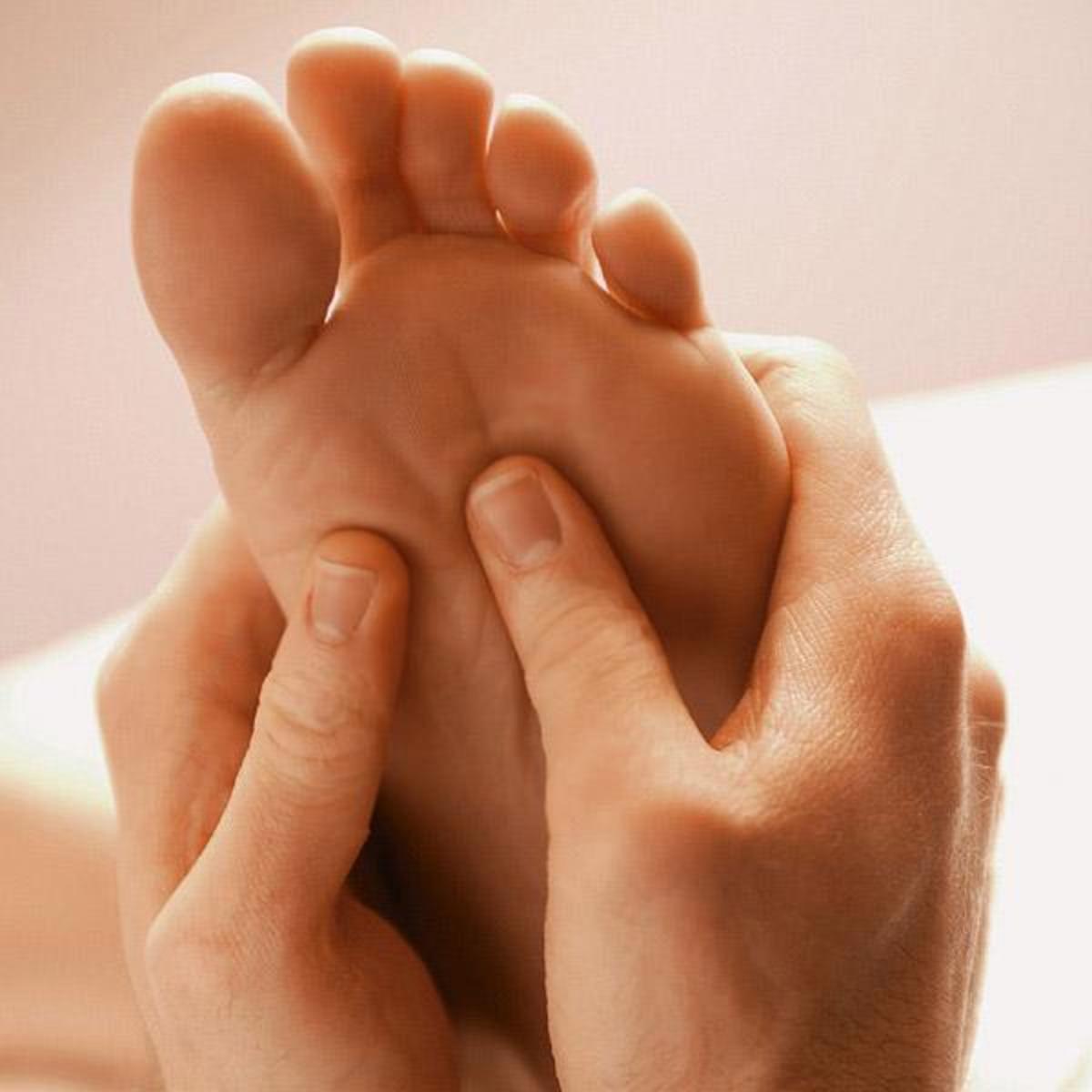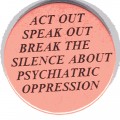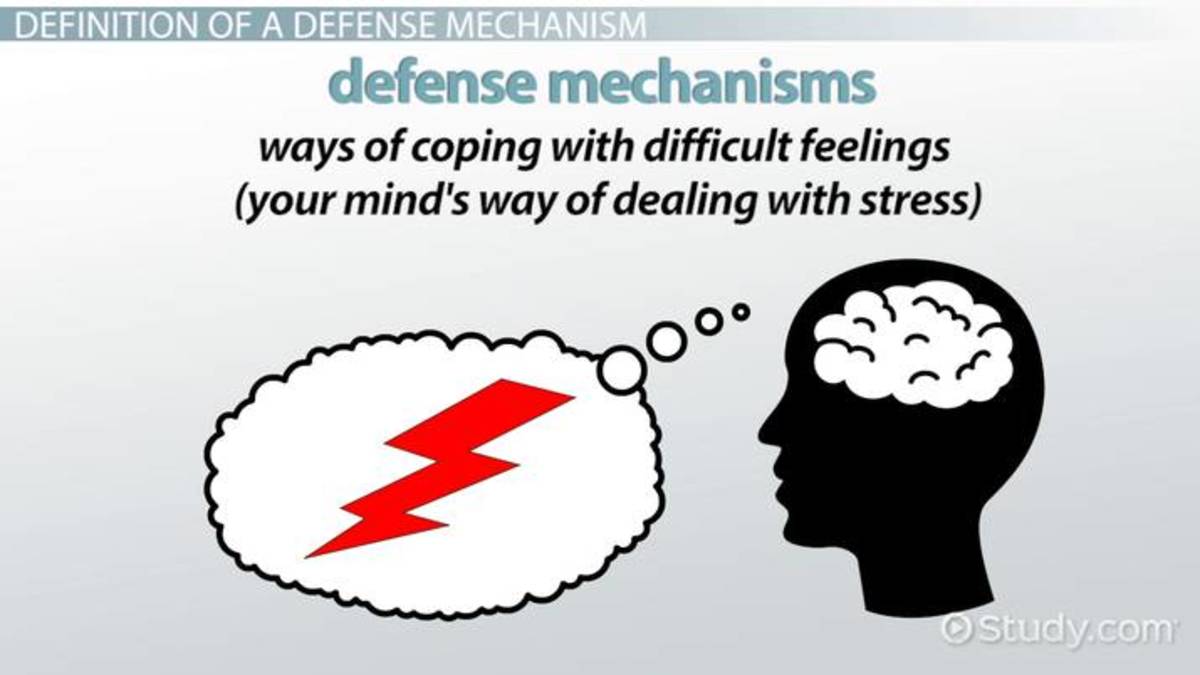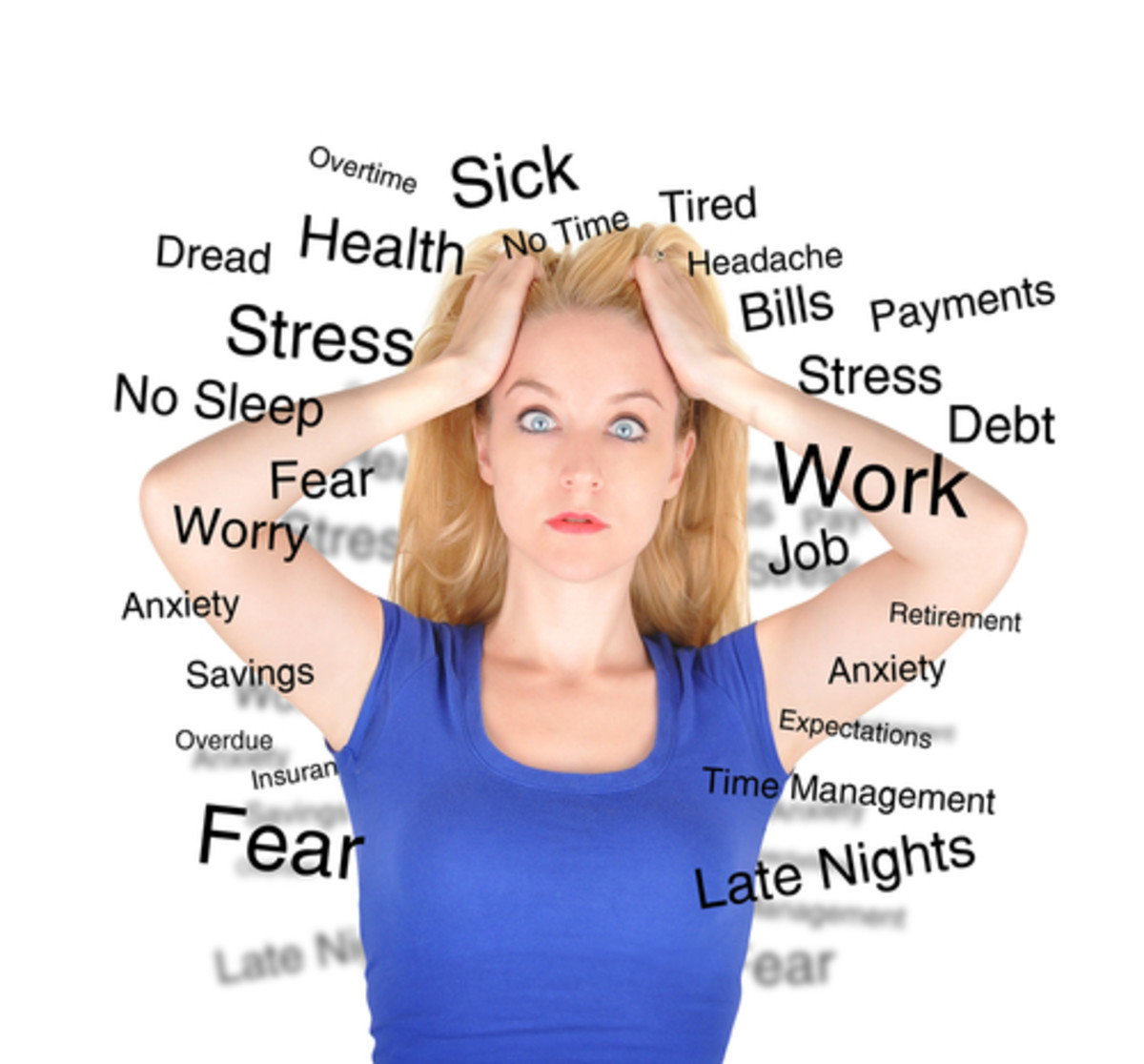- HubPages»
- Health»
- Mental Health»
- Stress Management
What Is Depression And How to Avoid It

What Is Depression And Who Gets depression?
Depression is the most common psychiatric condition faced by people nowadays. A variety of factors are known to be responsible for this condition like genetic, environmental factors, childhood trauma, chemical imbalances in the brain, lifestyle, low self-esteem, and economic conditions to name a few. The ancient Greek physician Hippocrates described it as “Melancholia”.
Who gets depression?
Anyone can get depression at some time in their lives though some people are more prone than others. Depressive illness brought on by life events do not last and the person soon recovers mainly with the passage of time and with the support of family and friends. But sometimes the illness is brought on without any identifiable external causes. Also, it is not clear why people react to events in different ways. Statistically, it is more common in women than in men. Along with high standards of living, people have high expectations and are easily frustrated and disappointed when they are unable to achieve those goals and end up getting depressed. Added to this is our generation’s status obsession on social media which can be quite harmful. In severe cases, the person can cause self-harm like abuse of alcohol, cigarette, and drugs and in extreme cases resort to suicide. Such people have low self-worth and these physical injuries may seem like self- punishments or short term means of relieving tension, anger or frustration. This illness can not only decrease the productivity and stability of the affected person but it can take a toll on the health of other members of the family too. Depression is mostly undiagnosed or undertreated as a detailed assessment of the case is not done routinely and only diagnosed when it gets very severe. Most of the times the patients are randomly prescribed anti-depressants which are inadequate and have a lot of side effects and can be harmful in the long run. So an accurate assessment of the disorder has to be done in order to chart out the correct treatment options for his recovery and rehabilitation.
Famous People Have faced depression
Many famous and successful people like Goethe, Winston Churchill, Leo Tolstoy, Vincent Van Gogh, and Hugo Wolf have suffered from depression. Winston Churchill called depression his black dog and that it was a frequent companion. Even Celebrities like Jim Carrey, Johnny Depp, Eminem, Kristen Bell to name a few have battled depression and conquered it.
Types Of Depression:
There are many types of depression. Whether caused by life events or physical conditions or major illnesses or certain medications, it is a condition that affects the daily life of the person and is sometimes life-threatening. Whatever the cause, it is important to diagnose the type of depression so that the correct treatment and therapy can be decided. The major types of depression can be classified as follows:
- Clinical depression or Major depression: The grief caused due to the loss of a loved person or object is natural but when it becomes prolonged and persists for two weeks or longer and affects the person’s everyday activities it is diagnosed as clinical depression. A Clinically depressed person will typically exhibit the following symptoms:
- Feeling sad or gloomy every day for the most part of the day
- Tired and listless most days of the week
- Loss of interest in pleasurable activities
- Lack of sleep or too much sleep
- Loss of appetite or too much eating
- Substantial weight gain or loss
- Slowed speech and movements
- Feeling worthless or hopeless all the time
- Constantly being anxious or worrying too much
- Thoughts of self-harm, death, and suicide
A variety of options like psychotherapy, cognitive behavioral therapy anti-depressant drugs are there for this disorder and treatment differs for each person depending on his individual needs. It is often a combination of medicine and therapy. Though the condition is not completely curable, the symptoms can be managed with the right treatment plan.
2. Dysthymia or persistent depressive disorder is a form of the disorder where the depression can last for years and can interfere with daily activities and relationships. Though this is not as severe as major depression, it can still affect the life of the person as he has to deal with feelings of sadness, anxiety, and hopelessness for years. It is a persistent depressive disorder and people go through life like robots, often without other people around them even noticing it. A combination of medications and therapy is used to treat this type of depression.
Types of Depression-Continued
3. Manic depression or bipolar depression is a rarer or special case where a person alternates between extremes of being sad and inactive, followed by elation and being very active. In this disorder, suicidal thoughts that change over to feelings of elation or euphoria are seen. These extreme mood swings can occur frequently or rarely like once or twice a year. Though the actual causes of this disorder cannot be concluded, it is believed that genetics plays an important role. The risk of developing this disorder increases substantially for a person whose first-degree relative suffered from the same. There is no cure for bipolar depression but can be managed with medication and therapy. This disorder is treated with anti-depressants, anti-psychotics and counseling and cognitive behavioral therapy.
Types Of Depression-Continued
4. Psychotic depression: People with psychosis and depression are said to have Psychotic depression. They have delusions and hallucinations and are out of touch with reality. They neglect their appearance, do not take bath or change clothes, get angry for no reason, keep aloof or stay in bed, do not talk to anyone much and say things that make no sense. Treatment for this disorder is usually done in hospital settings as they have to be closely monitored. Usually, it is a combination of antidepressants and anti-psychotic drugs.
5. A seasonal affective disorder which mostly occurs in winter when days are shorter and there is less sunlight. The lack of sunlight plays havoc with the biological clock in our body and reduces the Serotonin, a neurotransmitter that affects moods resulting in this disorder. It usually goes away in spring and summer. Exposure to sunlight increases the Serotonin, so patients are advised to get exposed to moderate amounts of sunlight. Effective treatments are light therapy, medications, and cognitive behavioral therapy.
Types Of Depression-More Types
6. Atypical depression: In this condition the person indulges in overeating, sleeping too much, strongly reactive moods or is extremely sensitive to rejection most of the time but suddenly cheers upon the advent of a positive event and may not show any signs of depression. Treatment options are anti-depressants which seem to work well in this type of disorder.
7. Other types of depression Post-Partum depression is when women go through depression during the first months after childbirth. Counseling and anti-depressants are treatment options for this disorder. And there is also depression caused by illness. Major, chronic or terminal illness can cause depression. Such people have long term pain and physical disability. Various illnesses like Parkinson’s disease, Huntington’s disease, Cushing’s syndrome, Hypo or Hyper Thyroidism, Multiple Sclerosis, Brain Injury, and Cancer can cause depression. Vitamin deficiencies and certain medications can also cause depression and treatment involving a combination of medications, counseling, and therapy, depending on the type of depression, is advised.
Timely Intervention is Important
Whatever may be the type of depression, it is very important for the physicians, healthcare providers and also family members to recognise the symptoms, and seek timely intervention before it is too late.

What Causes Depression?
Depression is a very complex disease and the exact reasons that cause depression are not known. It can occur due to a serious medical illness or due to the loss of a loved one. It could also be genetic. Sometimes for no apparent reason, a person may feel sad and dejected. The major triggers can be listed as:
- Serious illness-Other medical conditions and illnesses like Parkinson’s, Multiple Sclerosis, arthritis, diabetes, lupus, kidney disease, and heart disease to name a few, can cause depression. A feeling of sadness and hopelessness leading to depression not only delays the recovery from the illness but increases the progression of the disease.
- Loss of a near or loved one-Grief over the loss of a loved one can lead to depression. Grieving over the loss of a loved one is natural but when it extends for longer periods can lead to clinical depression. Research now shows that even the loss of a pet can be devastating for a pet owner and cause depression to him.
- Genetics-If a close relative in the family has the condition then the risks are more for that person as genetics play an important role in this condition. Especially in bipolar disorder, there is a tenfold increase in risk for a person if any member of his family had it. And the risk increases if the family member is a close relative.
- Medications-Certain medications like corticosteroids, opioids, barbiturates, and benzodiazepines which affect the serotonin which is responsible for mood regulation in a person, can increase the risk of depression. Levodopa, the drug used in the treatment of Parkinson’s disease can affect the neurotransmitter dopamine which can cause depression. To learn more about dopamine please refer my previous hub on Importance-Of-Dopamine-And-Methods to improve Dopamine-Naturally, the link of which I have given below:
Causes Of Depression-Continued
- Addictions-substance abuse, alcohol and cigarettes are a major cause of clinical depression. Though they give temporary high, they ultimately lead to depression. People take to addiction to escape from depressive situations which makes their condition even worse. Without treating the depression that drives one to addiction or the other way around, the problem can never be solved.
- Abuse and Living Conditions -Physical, mental or emotional abuse of any sort increases the chances of depression. The memories of abuse and trauma linger even when the situation improves, driving one to mental stress and depression. Research now proves that childhood trauma can cause depression later in life. Children who grow up in abusive and unhealthy environments tend to grow up to be psychotic and depressive.
- Other Reasons-Like quarrels with family members or friends, loneliness, change or loss of a job, separation from close family and friends can cause depression., Women face prenatal, postnatal and premenstrual depression. Depression faced by students in their campus life can lead to dangerous outcomes like suicide. Office stress can cause depression in working professionals. For Stress faced by working professionals and steps to overcome this stress naturally, please read my hub on Professionals and Stress, the link of which I have given below.
Proper Investigation of the Cause is Imperative
Ascertaining the cause of depression is important to chart out the correct treatment needed as a wrong diagnosis could adversely affect the health of the person
Importance-of-Dopamine
- Importance of Dopamine And Methods to Improve Dopamine Naturally
Dopamine is a powerful neurotransmitter in the brain which is responsible for motivation and focus. Deficiency of dopamine can lead to debilitating disorders like Parkinson's, Alzheimer's and dementia. The good news is that dopamine can be increased
Tips To Avoid Depression Among Young Children







Tips To Beat Depression Naturally: Among young children:
The causes of childhood depression can be many like physical health, life events, genetic susceptibility, and the environment. Most of the times parents fail to notice the child’s symptoms of depression as they tend to treat it as normal psychological and emotional change that occurs with growth. The main signs are when kids are sad, listless, and irritable, have problems focusing, lose interest in school work, and withdraw from friends and family. When the symptoms remain for a prolonged period of time it is better to take steps to address the problem. They may indulge in self-harm if left untreated. Steps to prevent depression in children:
1. Talk to the child every day and ask him or her how their day was, listen to their problems and offer support and show love. Give them a hug when they are sad as it soothes them and makes them feel safe and secure.
2. Nutritious food: It is natural for children to ask for junk food but should be restricted to once or twice a week. Ensure that the child has healthy, nutritious food with all the nutrients, vitamins and minerals as it is very important for their healthy growth.
3. Sleep: Ensure that the child has adequate sleep and have a fixed sleep routine, as good sleeping habits are essential for good for health and mental well-being.
4. Screen addiction can be dangerous-When a child spends more time on screen at the expense of other activities such as play, when he gets angry and irritable when he is not allowed to watch the TV or mobile or iPad then he is said to be screen-addicted and he has to be weaned out of it as it can be a potential risk to his health.
5. Encourage Outdoor Games-Outdoor games are very good for kids to stay healthy in mind and body. So parents should encourage children in sports such as football, volleyball, cricket, basketball. Regular physical activity not only keeps obesity in check but also has a positive effect on the mood of the child.
6. Fun Activities-Parents should engage in fun activities with the child, like singing, playing the guitar, swimming, solving puzzles together or playing word games. A relaxed and positive atmosphere is vital for a child to grow into a healthy individual. The child will cherish these good memories for a lifetime.
7. Reading books, story sessions, music sessions all help improve cognitive skills and at the same time develop a healthy mind.
8. Encourage Good Habits in children-Children learn by watching their parents. So Parents should practice healthy and disciplined habits like sleeping on time, waking up early, doing exercises, following a good diet, being kind and affectionate and inculcate the same in the children.
9. Growing up with Pets is healthy- Studies have shown that children who grow up with pets develop stronger immune systems, have greater empathy and are more responsible. They grow up to be well balanced and sympathetic.
10. Love of Nature-Children should be made environmentally conscious by teaching them the importance of plants and trees and the ecosystems for our survival on this planet so that they grow up to be nature protectors from a young age.
Childhood Is An Important Phase Of Life
Research has proved that positive childhood experiences have a great impact on the mental health of a person. Children who grow up in a warm, loving, caring and nurturing atmosphere have better cognitive development, good social skills and grow up to be happier and more successful, stable individuals in later life

Campus life and Depression:
Student life can be quite overwhelming and often take a toll on the young generation of students. The burden of assignments and examinations, financial stress along with peer pressure and ragging can cause quite a strain on the mental health of students and easily become susceptible to anxiety and depression. Most of the time they live on their own and so cannot take recourse to family support and often try to handle the problems on their own, not wanting to trouble the parents. Eventually they become prone to addictions. We hear and read instances of students committing suicide, unable to bear the burden. These young people are the future of a Nation, timely detection and treatment is crucial. So here are a few tips for students to deal with the hectic campus life:









Tips To Beat Depression At Campus
So here are a few tips for students to deal with to avoid depression during their hectic campus life:
- Start Journaling-Writing is known to be therapeutic. Make a list of things to be done and plan accordingly. Time management is the key to academic success.
- Stress Buster Activities in your free time like painting, sketching, drawing, singing and other group activities with your friends and peers so that a support system is created within the campus for you.
- Relax in between studying and classes with some relaxation techniques like deep breathing and meditation. Share your problems with close friends and seniors. Social interaction is very important.
- Screen Addiction and social media addiction is a major cause of depression and anxiety in young people nowadays. So take a detox from screen addiction and take to nature like gardening, mountaineering and such interesting activities which are good for your mental health.
- Music therapy is known to cure anxiety and depression. Listen to soothing music as often as possible to stay calm and relaxed.
- Proper Diet and Exercise and very important to maintain good physical and mental health. Abstain from junk food and aerated drinks; instead try to add lots of fruits, vegetables, greens and lentils, fish and eggs in your daily diet.
- Get Enough Sleep: Lack of proper sleep can be a drain on brain health, so avoid late nights and get good sleep to stay fit and active.
- Avoid Addictions: Alcohol, cigarettes and substance abuse are rampant on campus. Stay away from them as they can destroy your health and career.
- Talk about your anxieties and fears with someone. It could be your friend, your professor or even your parent.They will help. Keeping emotions bottled up can lead to anxiety and stress.
- Take professional help, maybe your college counselor or a psychiatrist, when you feel you cannot cope and the negative thoughts cannot be stopped.
Ask For Help, There Is Nothing To Be Ashamed Of
It is important to recognize the symptoms of depression in school and college-going students as studies have shown that mental health issues are increasing in the student community affecting not only their academic performance but have proved to be life-threatening in many cases. It is important for schools and colleges to provide proper support centers and for the students to take timely help and not let mental health issues affect their academic career and health.
Depression Due to Illness
While treating the major, chronic medical or terminal illness of patients, the physicians or health care providers often overlook the symptoms of depression and think that it is natural for such a person to feel sad or without hope. But studies have shown that depression can be detrimental to the treatment of the illness and can result in poorer prognosis and faster progression of the disease and also increases the use of tobacco and alcohol. Hence a proper investigation of the symptoms has to be done and depressive disorder has to be addressed. Research has shown that treating depression increased the efficacy of the treatment of medical illness and considerably improved the prognosis and reduced the progression of the disease. So all those involved in the care and treatment of people with major, chronic medical illness should identify and consider treatment of depression important and given priority.
Among the severe complications of Parkinson’s disease, depression is one of the most common which causes increased disability and reduces the quality of life. Symptoms of depression are not easily recognized in this disease as the debilitating symptoms often override the depressive symptoms. Treatment is difficult for such patients as the regular anti-depressants can aggravate the motor symptoms in such patients. Alternate treatment options like Psychotherapy and Cognitive behavior therapy seem to be safe and effective in these cases. To know more about Parkinson’s disease please read my hub on Parkinson's Disease, the link of which I have given below.
Parkinsons-disease
- Things to Avoid Doing With Parkinson’s Disease
Parkinson's disease is the second degenerative neurological disorder after Alzheimer's disease most prevalent now. It is estimated that 10 million people worldwide are affected by the disease. The incidence increases with age, and studies have shown
Workplace Stress



Depression Due To Work stress
Persistent stress at the workplace not only causes problems in the physical health of a person leading to disorders like obesity, diabetes, hypertension, cardiovascular diseases, sleeplessness, addictions, but can also affect his mental health. Depression may be due to various reasons like injustice, bias, unrecognized talent, unachievable and impossible targets, gossip-mongering and bullying at the workplace. A person with an anxious or worrisome nature can easily fall prey to depression in such an environment added to the fact that the job is a necessity for his survival and impossible for him to quit. He feels trapped and helpless which takes a toll on his mental and physical health. This affects the productivity of the organization or company that the person works for. A genuine employer should never goad his employees to lose their physical and mental health in the name of productivity. Rather by providing a stable, friendly, and good work environment to its employees, the company or organization can boost its economic status. Because of the stigma associated with mental disorders, most employees do not seek help which only worsens their condition. Employers fail to recognize that when workplace happiness goes up the productivity also increases. It is time that they realized that providing a psychologically healthy work environment is not only vital to the health of the employees but to the survival of the company itself. The working professionals on their part should be vigilant and not let work stress affect their psychological well-being by following few simple strategies like having positive thoughts, mindfulness, take one step at a time and not get burdened by anxiety or worry, by developing healthy habits, journaling, cultivating interesting hobbies, spending time in natural surroundings. As the saying goes “A healthy mind in a healthy body”, good mental health along with good physical health is very important to lead a blissful life. For more tips on managing stress at the workplace, please read my hub on Professionals-And-stress, the link of which I have given below:
Professionals and Stress
- Professionals and Stress
Stress faced by professionals is a serious cause for concern in a highly competitive world today as it is a threat to their physical and mental health. Stress leads to many lifestyle diseases like diabetes, high blood pressure, depression, at a very
Have A Great Life
"Most folks are as happy as they make up their minds to be"-Abraham Lincoln
So folks make up your mind to be happy, don't let Workplace stress get the better of you. Joyfulness is more important than any other drug. So stop overthinking, take responsibility, write down in a journal, what each day's positive events are, practice gratefulness for the good things you have. Replace negative thoughts with positive thoughts, try to be yourself and have a great life.
Final Thoughts
Depression and suicide have become more common than ever before, especially among the younger generation.Talking about mental health issues is still taboo in our society due to the social stigma and myths attached to it. So few people come out in the open about it or try to seek professional help. So it is important to create awareness among people to seek help when things go out of control and they are unable to cope with the problem. Many are not even aware that there are solutions to their problems. Much needs to be done to provide help and to encourage self- help for the sufferers. Parents, teachers’, friends and family members need to be vigilant and recognize the symptoms early on and get timely help to avoid complications. There are many natural ways to avoid depression but there may be instances where professional help is required. Studies have shown that lifestyle changes can greatly improve symptoms of depression and help the affected people to lead normal lives. Holistic healing is very effective.
This content is accurate and true to the best of the author’s knowledge and does not substitute for diagnosis, prognosis, treatment, prescription, and/or dietary advice from a licensed health professional. Drugs, supplements, and natural remedies may have dangerous side effects. If pregnant or nursing, consult with a qualified provider on an individual basis. Seek immediate help if you are experiencing a medical emergency.
© 2019 VIDYA D SAGAR


